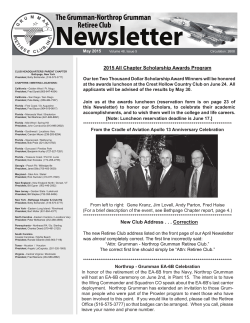
Datasheet - Northrop Grumman Corporation
Space Weather Analysis and Forecast System Predicting space weather for the warfighter F or integrated meteorological data, Department of Defense (DoD), national intelligence community and commercial entities rely on satellite communications and global positioning systems, which are impacted by space weather events. The Space Weather Analysis and Forecast System (SWAFS) represents the latest technology and modeling available to evaluate and forecast the magnitude and duration of these events. SWAFS_datasht_2013.indd 1 As prime contractor for SWAFS, Northrop Grumman assists the Air Force Weather Agency (AFWA) in creating products that depict the analysis and prediction of space weather to show their impact on military operations. SWAFS enhances forward theater commanders’ situational awareness, through specifying and forecasting unfavorable effects of space weather on DoD communications and weapons systems. Support for More Capable Analysis Space weather forecast and analysis functions are fully integrated into AFWA’s infrastructure, leveraging existing resources. Northrop Grumman continually improves SWAFS by integrating upgraded/new space weather models, data sources and applications. To successfully integrate these models, data and applications, the company maintains close collaboration with academia and national laboratories researching space weather. 4/2/2013 3:12:01 PM Assessing near-term data sources for these models from ground and space-based sensors comprises a significant portion of our ongoing analysis to enhance the DoD Space Weather capability. Data is stored in a central space weather data repository developed and maintained by Northrop Grumman. This data repository includes both raw data from space and ground based sensors, as well as derived and forecast data created by models and applications that Northrop Grumman integrated into the system. These data are available to the warfighter through the netcentric capability fielded and being upgraded by the company. Northrop Grumman also facilitates technology improvements and enhancements to the current set of data assimilation models. Spiral Development Supports Evolving Space Weather Capability Northrop Grumman brings a broad set of skills to SWAFS, ranging from software and systems engineering to space physics expertise. The company employs a spiral development approach to deliver incremental upgrades to SWAFS, allowing new requirements to be rapidly incorporated into the development process and easing sustainment of delivered code. The company’s top-level system and software development team is implementing cutting-edge space weather tools, leading to enhanced performance and cost-saving measures. With its evolutionary development strategy, premier program management, and extensive collaboration with space weather stakeholders, Northrop Grumman delivers success to the SWAFS program. SWAFS Space Weather Products • Auroral Oval Location Overlays • Geomagnetic Analysis & Forecast Bulletins • High Flyer Radiation Advisories • Spacecraft Charging Analysis • Space Environment Global Situational Awareness Summaries • Space Weather Events & Warnings • Tailored Production of Space Weather Effects on HF & UHF Communications SWAFS Additional Capabilities • Centralized space weather data repository • Net-centric access to space environmental data and products HF Illumination Map (GAIM, using Ionosonde Data) GPS Single Frequency Error Map (GAIM, using TEC Observations) For more information, please contact: Northrop Grumman Information Systems Space Operations & Environmental Solutions Business Unit 3200 Samson Way Bellevue, NE 68123 Tel. 402-682-5866 Fax 402-682-4677 E-mail: joseph.marshall@ngc.com www.northropgrumman.com © 2013 Northrop Grumman Systems Corporation. All rights reserved. Approved for Public Release: 13-0083 IS8320413ISD SWAFS_datasht_2013.indd 2 4/2/2013 3:12:01 PM
© Copyright 2025



















